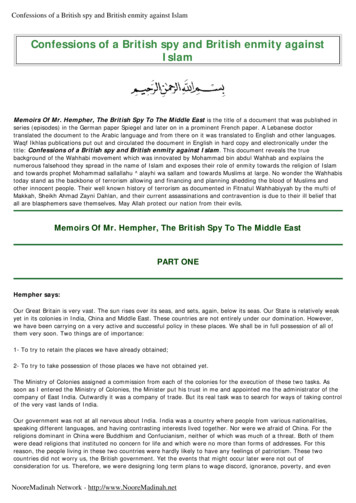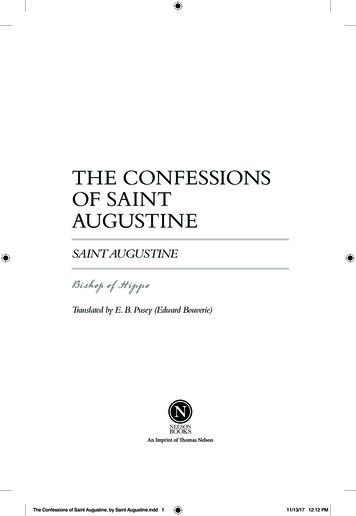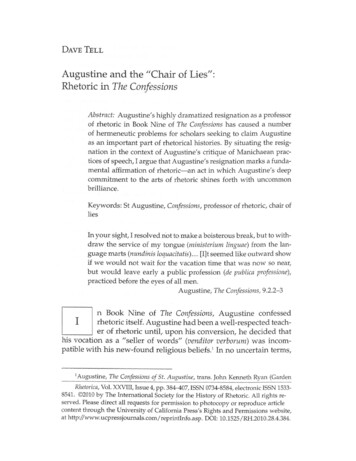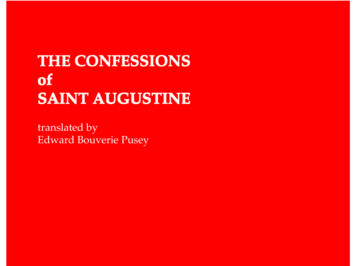
Transcription
Confessions of a British spy and British enmity against IslamConfessions of a British spy and British enmity againstIslamMemoirs Of Mr. Hempher, The British Spy To The Middle East is the title of a document that was published inseries (episodes) in the German paper Spiegel and later on in a prominent French paper. A Lebanese doctortranslated the document to the Arabic language and from there on it was translated to English and other languages.Waqf Ikhlas publications put out and circulated the document in English in hard copy and electronically under thetitle: Confessions of a British spy and British enmity against Islam. This document reveals the truebackground of the Wahhabi movement which was innovated by Mohammad bin abdul Wahhab and explains thenumerous falsehood they spread in the name of Islam and exposes their role of enmity towards the religion of Islamand towards prophet Mohammad sallallahu alayhi wa sallam and towards Muslims at large. No wonder the Wahhabistoday stand as the backbone of terrorism allowing and financing and planning shedding the blood of Muslims andother innocent people. Their well known history of terrorism as documented in Fitnatul Wahhabiyyah by the mufti ofMakkah, Sheikh Ahmad Zayni Dahlan, and their current assassinations and contravention is due to their ill belief thatall are blasphemers save themselves. May Allah protect our nation from their evils.Memoirs Of Mr. Hempher, The British Spy To The Middle EastPART ONEHempher says:Our Great Britain is very vast. The sun rises over its seas, and sets, again, below its seas. Our State is relatively weakyet in its colonies in India, China and Middle East. These countries are not entirely under our domination. However,we have been carrying on a very active and successful policy in these places. We shall be in full possession of all ofthem very soon. Two things are of importance:1- To try to retain the places we have already obtained;2- To try to take possession of those places we have not obtained yet.The Ministry of Colonies assigned a commission from each of the colonies for the execution of these two tasks. Assoon as I entered the Ministry of Colonies, the Minister put his trust in me and appointed me the administrator of thecompany of East India. Outwardly it was a company of trade. But its real task was to search for ways of taking controlof the very vast lands of India.Our government was not at all nervous about India. India was a country where people from various nationalities,speaking different languages, and having contrasting interests lived together. Nor were we afraid of China. For thereligions dominant in China were Buddhism and Confucianism, neither of which was much of a threat. Both of themwere dead religions that instituted no concern for life and which were no more than forms of addresses. For thisreason, the people living in these two countries were hardly likely to have any feelings of patriotism. These twocountries did not worry us, the British government. Yet the events that might occur later were not out ofconsideration for us. Therefore, we were designing long term plans to wage discord, ignorance, poverty, and evenNooreMadinah Network - http://www.NooreMadinah.net
Confessions of a British spy and British enmity against Islamdiseases in these countries. We were imitating the customs and traditions of these two countries, thus easilyconcealing our intentions.What frazzled our nerves most was the Islamic countries. We had already made some agreements, all of which wereto our advantage, with the Sick Man (the Ottoman Empire). Experienced members of the Ministry of Coloniespredicted that this sick man would pass away in less than a century. In addition, we had made some secretagreements with the Iranian government and placed in these two countries statesmen whom we had made masons.Such corruptions as bribery, incompetent administration and inadequate religious education, which in its turn led tobusying with pretty women and consequently to neglect of duty, broke the backbones of these two countries. In spiteof all these, we were anxious that our activities should not yield the results we expected, for reasons I am going tocite below:1- Muslims are extremely devoted to Islam. Every individual Muslims is as strongly attached to Islam as a priest ormonk to Christianity, if not more. As it is known, priests and monks would rather die than give up Christianity. Themost dangerous of such people are the Shiites in Iran. For they put down people who are not Shiites as disbelieversand foul people. Christians are like noxious dirt according to Shiites. Naturally, one would do one's best to get rid ofdirt. I once asked a Shiite this: Why do you look on Christians as such? The answer I was given was this: "TheProphet of Islam was a very wise person. He put Christians under a spiritual oppression in order to make them findthe right way by joining Allah's religion, Islam. As a matter of fact, it is a State policy to keep a person founddangerous under a spiritual oppression until he pledges obedience. The dirt I am speaking about is not material; it isa spiritual oppression which is not peculiar to Christians alone. It involves Sunnites and all disbelievers. Even ourancient Magian Iranian ancestors are foul according to Shiites."I said to him: "Well! Sunnites and Christians believe in Allah, in Prophets, and in the Judgment Day, too; why shouldthey be foul, then?" He replied, "They are foul for two reasons: They impute mendacity to our Prophet, HadratMuhammad may Allah protect us against such an act! (1)* And we, in response to this atrocious imputation, followthe rule expressed in the saying, If a person torments you, you can torment him in return', and say to them: 'You arefoul.' Second; Christians make offensive allegations about the Prophets of Allah. For instance, they say: Isaa (Jesus)'alaihis-salaam' would take (hard) drinks. Because he was accursed, he was crucified."In consternation, I said to the man that Christians did not say so. "Yes, they do," was the answer, "and you don'tknow. It is written so in the Holy Bible." I became quite. For the man was right in the first respect, if not in thesecond respect. I did not want to continue the dispute any longer. Otherwise they might be suspicious of me in anIslamic attire as I was. I therefore avoided such disputes.2- Islam was once a religion of administration and authority. And Muslims were respected. It would be difficult to tellthese respectable people that they are slaves now. Nor would it be possible to falsify the Islamic history and say toMuslims: The honor and respect you obtained at one time was the result of some (favorable) conditions. Those daysare gone now, and they will never come back.3- We were very anxious that the Ottomans and Iranians might notice our plots and foil them. Despite the fact thatthese two States had already been debilitated considerably, we still did not feel certain because they had a centralgovernment with property, weaponry, and authority.4- We were extremely uneasy about the Islamic scholars. For the scholars of Istanbul and Al-adh-har, the Iraqi andDamascene scholars were insurmountable obstacles in front of our purposes. For they were the kind of people whowould never compromise their principles to the tiniest extent because they had turned against the transient pleasuresand adornments of the world and fixed their eyes on the Paradise promised by Qur'aan al-kereem. The peoplefollowed them. Even the Sultan was afraid of them. Sunnites were not so strongly adherent to scholars as wereShiites. For Shiites did not read books; they only recognized scholars, and did not show due respect to the Sultan.Sunnites, on the other hand, read books, and respected scholars and the Sultan.We therefore prepared a series of conferences. Yet each time we tried we saw with disappointment that the road wasclosed for us. The reports we received from our spies were always frustrating, and the conferences came to naught.We did not give up hope, though. For we are the sort of people who have developed the habit of taking a deep breathand being patient.NooreMadinah Network - http://www.NooreMadinah.net
Confessions of a British spy and British enmity against IslamThe Minister himself, the highest priestly orders, and a few specialists attended one of our conferences. There weretwenty of us. Our conference lasted three hours, and the final session was closed without reaching a fruitfulconclusion. Yet a priest said, "Do not worry! For the Messiah and his companions obtained authority only after apersecution that lasted three hundred years. It is hoped that, from the world of the unknown, he will cast an eye onus and grant us the good luck of evicting the unbelievers, (he means Muslims), from their centers, be it three hundredyears later. With a strong belief and long-term patience, we must arm ourselves! In order to obtain authority, wemust take possession of all sorts of media, try all possible methods. We must try to spread Christianity amongMuslims. It will be good for us to realize our goal, even if it will be after centuries. For fathers work for their children."A conference was held, and diplomats and religious men from Russia and France as well as from England attended. Iwas very lucky. I, too, attended because I and the Minister were in very good terms. In the conference, plans ofbreaking Muslims into groups and making them abandon their faith and bringing them round to belief (Christianizingthem) like in Spain was discussed. Yet the conclusions reached were not as had been expected. I have written all thetalks held in that conference in my book "Ilaa Melekoot-il-Meseeh."It is difficult to suddenly uproot a tree that has sent out its roots to the depths of the earth. But we must makehardships easy and overcome them. Christianity came to spread. Our Lord the Messiah promised us this. The badconditions that the east and the west were in, helped Muhammad. Those conditions being gone, have taken away thenuisances (he means Islam) that accompanied them. We observe with pleasure today that the situation has changedcompletely. As a result of great works and endeavors of our ministry and other Christian governments Muslims are onthe decline now. Christians, on the other hand, are gaining ascendancy. It is time we retook the places we lostthroughout centuries. The powerful State of Great Britain pioneers this blessed task [of annihilating Islam].PART TWOIn the Hijree year 1122, C.E. 1710, the Minister of Colonies sent me to Egypt, Iraq, Hidjaz and Istanbul to act as a spyand to obtain information necessary and sufficient for the breaking up of Muslims. The Ministry appointed nine morepeople, full of agility and courage, for the same mission and at the same time. In addition to the money, informationand maps we would need, we were given a list containing names of statesmen, scholars, and chiefs of tribes. I cannever forget! When I said farewell to the secretary, he said, "The future of our State is dependent on your success.Therefore you should exert your utmost energy."I set out on a voyage to Istanbul, the center of the Islamic caliphate. Besides my primary duty, I was to learn verywell Turkish, the native language of the Muslims being there. I had already learned in London a considerable amountof Turkish, Arabic (the language of the Qur'aan) and Persian, the Iranian language. Yet learning a language was quitedifferent from speaking that language like its native speakers. While the former skill can be acquired in a matter of afew years, the latter requires a duration of time several times as long as this. I had to learn Turkish with all itssubtleties lest the people should suspect me.I was not anxious that they should suspect me. For Muslims are tolerant, open-hearted, benevolent, as they havelearnt from their Prophet Muhammad 'alai-his-salaam'. They are not skeptical like us. After all, at that time the Turkishgovernment did not have an organization to arrest spies.After a very tiresome voyage I arrived in Istanbul. I said my name was Muhammad and began to go to the mosque,Muslims' temple. I liked the way Muslims observed discipline, cleanliness and obedience. For a moment I said tomyself: Why are we fighting these innocent people? Is this what our Lord the Messiah advised us? But I at oncerecovered from this diabolical [!] thought, and decided to carry out my duty in the best manner.In Istanbul I met an old scholar named "Ahmed Efendi." With his elegant manners, open-heartedness, spirituallimpidity, and benevolence, none of our religious men I had seen could have equalled him. This person endeavoredday and night to make himself like the Prophet Muhammad. According to him, Muhammad was the most perfect, theNooreMadinah Network - http://www.NooreMadinah.net
Confessions of a British spy and British enmity against Islamhighest man. Whenever he mentioned his name his eyes would become wet. I must have been very lucky, for he didnot even ask who I was or where I was from. He would address me as "Muhammad Efendi." He would answer myquestions and treat me with tenderness and with compassion. For he considered me a guest who had come toIstanbul to work in Turkey and to live in the shadow of the Khaleefa, the representative of the Prophet Muhammad.Indeed, this was the pretext I used to stay in IstanbulOne day I said to Ahmed Efendi: "My parents are dead. I don't have any brothers or sisters, and I haven't inheritedany property. I came to the center of Islam to work for a living and to learn Qur'aan al-kereem and the Sunnat, thatis, to earn both my worldly needs and my life in the Hereafter." He was very delighted with these words of mine, andsaid, "You deserve to be respected for these three reasons." I am writing down exactly what he said:"1- You are a Muslim. All Muslims are brothers.2- You are a guest. Rasoolullah 'sall-allaahu alaihi wa sallam' declared: 'Offer kind hospitality to your guests!'3- You want to work. There is a hadeeth-i shereef stating that 'a person who works is beloved to Allah.' "These words pleased me very much. I said to myself, "Would that there were such bright truths in Christianity, too!It's a shame there aren't any." What surprised me was the fact that Islam, such a noble religion as it was, was beingdegenerated in the hands of these conceited people who were quite unaware of what was going on in life.I said to Ahmed Efendi that I wanted to learn Qur'aan al-kereem. He replied that he would teach me with pleasure,and began to teach me (Faatiha soora). He would explain the meanings as we read. I had great difficulty pronouncingsome words. In two years' time I read through the whole Qur'aan al-kereem. Before each lesson he would makeablution himself and also command me to make ablution. He would sit towards the qibla (Ka'ba) and then beginteaching.What Muslims call ablution consisted of a series of washings, as follows:1) Washing the face;2) Washing the right arm from fingers to elbows;3) Washing the left arm from fingers to elbows;4) Making masah of (moistening both hands and rubbing them gently on) the head, backs of ears, (back of) neck;5) Washing both feet.Having to use the miswaak vexed me very much. "Miswaak" is a twig with which they (Muslims) clean their mouthand teeth. I thought this piece of wood was harmful for the mouth and teeth. Sometimes it would hurt my mouth andcause bleeding. Yet I had to use it. For, according to them, using the "miswaak" was a muakkad sunnat of theProphet. They said this wood was very useful. Indeed, the bleeding of my teeth came to an end. And the foul breaththat I had till that time, and which most British people have, was gone.During my stay in Istanbul I spent the nights in a room I had rented from a man responsible for the service in amosque. This servant's name was "Marwaan Efendi". Marwaan is the name of one of the Sahaaba (Companions) ofthe Prophet Muhammad. The servant was a very nervous man. He would boast about his name and tell me that if Ishould have a son in the future I should "name him Marwaan, because Marwaan is one of Islam's greatest warriors.""Marwaan Efendi" would prepare the evening dinner. I would not go to work on Friday, a holiday for Muslims. On theother days of the week I worked for a carpenter named Khaalid, being paid on a weekly basis. Because I worked parttime, from morning till noon, that is, he would give me half the wage he gave the other employees. This carpenterwould spend much of his free time telling about the virtues of "Khaalid bin Waleed." Khaalid bin Waleed, one of theSahaaba of the Prophet Muhammad, is a great mujaahid (a warrior for Islam). He accomplished various IslamicNooreMadinah Network - http://www.NooreMadinah.net
Confessions of a British spy and British enmity against Islamconquests. Yet his (Khaalid bin Waleed's) dismissal from office by 'Umar bin Hattaab during the latter's caliphatechafed the carpenter's heart(2)*."Khaalid", the carpenter for whom I worked, was an immoral and extremely neurotic person. He somehow trusted mevery much. I do not know why, but perhaps it was because I always obeyed him. He ignored the Sharee'at (Islaam'scommandments) in his secret manners. Yet when he was with his friends he would display obedience to thecommandments of the Sharee'at. He would attend the Friday prayers, but I am not sure about the other (daily)prayers.I would have breakfast in the shop. After work I would go to the mosque for noon prayer and would stay there tillafternoon prayer. After the afternoon prayer I would go to Ahmed Efendi's place, where he would teach me suchlessons as (reading) Qur'aan al-kereem, Arabic and Turkish languages for two hours. Every Friday I would give himmy weekly earnings because he taught me very well. Indeed, he taught me very well how to read Qur'aan al-kereem,requirements of the Islamic religion and the subtleties of Arabic and Turkish languages.When "Ahmed Efendi" knew that I was single, he wanted to marry me to one of his daughters. I refused his offer. Buthe insisted, saying that marriage is a sunnat of the Prophet's and the Prophet had stated that "A person who turnsaway from my sunnat is not with me." Apprehending that this event might put an end to our personal dealings, I hadto lie to him, saying that I lacked sexual power. Thus I ensured the continuance of our acquaintance and friendship.When my two-year stay in Istanbul was over, I told "Ahmed Efendi" I wanted to go back home. He said, "No, don'tgo. Why are you going? You can find anything you might look for in Istanbul. Allaahu ta'aalaa has given both thereligion and the world at the same time in this city. You say that your parents are dead and you have no brothers orsisters. Why don't you settle down in Istanbul?." "Ahmed Efendi" had formed a compulsive dependence upon mycompany. For this reason he did not want to part company with me and insisted that I should make my home inIstanbul. But my patriotic sense of duty compelled me to go back to London, to deliver a detailed report concerningthe center of the caliphate, and to take new orders.Throughout my stay in Istanbul I sent reports of my observations monthly to the Ministry of Colonies. I rememberasking in one of my reports what I was to do should the person I was working for ask me to practice sodomy withhim. The reply was: You can do it if it will help you attain your goal. I was very much indignant over this answer. I feltas if the whole world had fallen down on my head. I already knew that this vicious deed was very common inEngland. Yet it had never occurred to me that my superiors would command me to commit it. What could I do? I hadno other way than to empty the drug to the dregs. So I kept quiet and went on with my duty.As I said farewell to "Ahmed Efendi", his eyes became wet and he said to me, "My son! May Allaahu ta'aalaa be withyou! If you should come back to Istanbul and see that I am dead, remember me. Say the (soora) Faatiha for my soul!We will meet on the Judgement Day in front of 'Rasoolullah'." Indeed, I felt very sad, too; so much so that I shedwarm tears. However, my sense of duty was naturally stronger.PART THREEMy friends had returned to London before I did and they had already received new commands from the Ministry. I,too, was given new commands upon returning. Unfortunately, only six of us were back.One of the other four people, the secretary said, had become a Muslim and remained in Egypt. Yet the secretary wasstill glad because, he said, he (the person who had remained in Egypt) had not betrayed any secrets. The second onehad gone to Russia and remained there. He was Russian in origin. The secretary was very sorry about him, notbecause he had gone back to his homeland, but because perhaps he had been spying on the Ministry of Colonies forRussia and had gone back home because his mission had been over. The third one, as the secretary related, had diedof plague in a town named "Imara" in the neighborhood of Baghdaad. The fourth person had been traced by theNooreMadinah Network - http://www.NooreMadinah.net
Confessions of a British spy and British enmity against IslamMinistry up to the city of San'aa in the Yemen and they had received his reports for one year, and thereafter hisreporting had come to an end and no trail of him had been found despite all sorts of efforts. The Ministry put downthe disappearance of these four men as a catastrophe. For we are a nation with great duties versus a smallpopulation. We therefore do very fine calculations on every man.After a few of my reports, the secretary held a meeting to scrutinize the reports given by four of us. When my friendssubmitted their reports pertaining to their tasks, I, too, submitted my report. They took some notes from my report.The Minister, the secretary, and some of those who attended the meeting praised my work. Nevertheless I was thethird best. The first grade was won by my friend "George Belcoude", and "Henry Fanse" was the second best.I had doubtlessly been greatly successful in learning Turkish and Arabic languages, the Qur'aan and the Sharee'at. YetI had not managed to prepare for the Ministry a report revealing the weak aspects of the Ottoman Empire. After thetwo-hour meeting, the secretary asked me the reason for my failure. I said, "My essential duty was to learn languagesand the Qur'aan and the Sharee'at. I could not spare time for anything in addition. But I shall please you this time ifyou trust me." The secretary said I was certainly successful but he wished I had won the first grade. (And he wenton):"O Hempher, your next mission comprises these two tasks:1- To discover Muslims' weak points and the points through which we can enter their bodies and disjoin their limbs.Indeed, this is the way to beat the enemy.2- The moment you have detected these points and done what I have told you to, [in other words, when you manageto sow discord among Muslims and set them at loggerheads with one another], you will be the most successful agentand earn a medal from the Ministry."I stayed in London for six months. I married my paternal first cousin, "Maria Shvay". At that time I was 22 years old,and she was 23. "Maria Shvay was a very pretty girl, with average intelligence and an ordinary cultural background.The happiest and the most cheerful days of my life were those that I spent with her. My wife was pregnant. We wereexpecting our new guest, when I received the message containing the order that I should leave for Iraq.Receiving this order at a time while I was awaiting the birth of my son made me sad. However, the importance Iattached to my country, doubled with my ambition to attain fame by being chosen the best one among mycolleagues, was above my emotions as a husband and as a father. So I accepted the task without hesitation. My wifewanted me to postpone the mission till after the child's birth. Yet I ignored what she said. We were both weeping aswe said farewell to each other. My wife said, "Don't stop writing to me! I shall write you letters about our new home,which is as valuable as gold." These words of hers stirred up storms in my heart. I almost cancelled the travel. Yet Imanaged to take control of my emotions. Extending my farewell to her, I left for the ministry to receive the finalinstructions.Six months later I found myself in the city of Basra, Iraq. The city people were partly Sunnite and partly Shiite. Basrawas a city of tribes with a mixed population of Arabs, Persians and a relatively small number of Christians. It was thefirst time in my life that I met with the Persians. By the way, let me touch upon Shi'ism and Sunnism.Shiites say that they follow 'Alee bin Aboo Taalib, who was the husband of Muhammad's 'alaihis-salaam' daughterFaatima and at the same time Muhammad's 'alaihis-salaam' paternal first cousin. They say that Muhammad 'alaihissalaam' appointed Alee, and the twelve imaams, 'Alee's descendants to succeed him as the Khaleefa.In my opinion, the Shi'ees are right in the matter pertaining to the caliphate of 'Alee, Hasan, and Huseyn. For, as faras I understand from the Islamic history, Alee was a person with the distinguished and high qualifications required forcaliphate. Nor do I find it alien for Muhammad 'alaihis-salaam' to have appointed Hasan and Huseyn as Khaleefas.What makes me suspect, however, is Muhammad's 'alaihis-salaam' having appointed Huseyn's son and eight of hisgrandsons as Khaleefas. For Huseyn was a child at Muhammad's 'alaihis-salaam' death. How did he know he wouldhave eight grandsons. If Muhammad 'alaihis-salaam' was really a Prophet, it was possible for him to know the futureby being informed by Allaahu ta'aalaa, as the Messiah had divined about the future. Yet Muhammad's 'alaihis-salaam'NooreMadinah Network - http://www.NooreMadinah.net
Confessions of a British spy and British enmity against IslamProphethood is a matter of doubt to us Christians.Muslims say that "There are many proofs for Muhammad's 'alaihis-salaam' Prophethood. One of them is the Qur'aan(Koran)." I have read the Qur'aan. Indeed, it is a very high book. It is even higher than the Torah (Taurah) and theBible. For it contains principles, regulations, moral rules, etc.It has been a wonder to me how an illiterate person such as Muhammad 'alaihis-salaam' could have brought such alofty book, and how could he have had all those moral, intellectual and personal qualifications which could not bepossessed even by a man who has read and travelled very much. I wonder if these facts were the proofs forMuhammad's 'alaihis-salaam' Prophethood?I always made observations and research in order to elicit the truth about Muhammad's 'alaihis-salaam' Prophethood.Once I brought out my interest to a priest in London. His answer was fanatical and obdurate, and was not convincingat all. I asked Ahmed Efendi several times when I was in Turkey, yet I did not receive a satisfactory answer from him,either. To tell the truth, I avoided asking Ahmed Efendi questions directly related to the matter lest they shouldbecome suspicious about my espionage.I think very much of Muhammad 'alaihis-salaam'. No doubt, he is one of Allah's Prophets about whom we have read inbooks. Yet, being a Christian, I have not believed in his Prophethood yet. It is doubtless that he was very muchsuperior to geniuses.The Sunnites, on the other hand, say that "After the Prophet's passing away, Muslims considered Aboo Bekr and'Umar and 'Uthmaan and 'Alee suitable for the caliphate."Controversies of this sort exist in all religions, most abundantly in Christianity. Since both 'Umar and 'Alee are deadtoday, maintaining these controversies would serve no useful purpose. To me, if Muslims are reasonable, they shouldthink of today, not of those very old days(3)*.One day in the Ministry of Colonies I made a reference to the difference between the Sunnites and the Shiites, saying,"If Muslims knew something about life, they would resolve this Shiite-Sunnite difference among themselves and cometogether." Someone interrupted me and remonstrated, "Your duty is to provoke this difference, not to think of how tobring Muslims together."Before I set out for my travel to Iraq, the secretary said, "O Hempher, you should know that there has been naturaldifferences among human beings since God created Abel and Cain. These controversies shall continue until the returnof the Messiah. So is the case with racial, tribal, territorial, national, and religious controversies."Your duty this time is to diagnose these controversies well and to report to the ministry. The more successful you arein aggravating the differences among Muslims the greater will be your service to England."We, the English people, have to make mischief and arouse schism in all our colonies in order that we may live inwelfare and luxury. Only by means of such instigations will we be able to demolish the Ottoman Empire. Otherwise,how could a nation with a small population bring another nation with a greater population under its sway? Look forthe mouth of the chasm with all your might, and get in as soon as you find it. You should know that the Ottoman andIranian Empires have reached the nadir of their lives. Therefore, your first duty is to instigate the people against theadministration! History has shown that 'The source of all sorts of revolutions is public rebellions.' When the unity ofMuslims is broken and the common sympathy among them is impaired, their forces will be dissolved and thus we shalleasily destroy them."PART FOURNooreMadinah Network - http://www.NooreMadinah.net
Confessions of a British spy and British enmity against IslamWhen I arrived in Basra, I settled in a mosque. The imaam of the mosque was a Sunnite person of Arabic originnamed Shaikh 'Umar Taaee. When I met him I began to chat with him. Yet he suspected me at the very beginningand subjected me to a shower of questions. I man
of all these, we were anxious that our activities should not yield the results we expected, for reasons I am going to cite below: 1- Muslims are extremely devoted to Islam. Every individual Muslims is as strongly attached to Islam as a priest or monk to Christianity, if not more. As it is known, priests and monks would rather die than give up .










